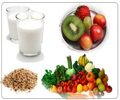Due to faulty lifestyles, obesity has become a major health concern across the globe, including developing nations. Obesity refers to having too much adipose tissue or fat in the body.
It has been suggested that micronutrient deficiency increases susceptibility to obesity. Calorie restriction during dieting may further worsen the micronutrient deficiency in these individuals. Hence, it is possible that addition of micronutrients will be beneficial in these cases.Alma Tovar and colleagues conducted a randomized clinical trial in obese Mexican women that was published in Nutrition Journal 2012.
The researchers state, “Obesity is a medical condition in which excess body fat has accumulated to the extent that it may have an adverse effect on health, leading to reduced life expectancy and/or increased health problems.”
The objective of the trial was to determine the efficacy of partial meal replacement with or without inulin on lipid reduction and intake of micronutrients in obese women of Mexico.
Partial meal replacements are replacements of one or two meals with lower calories meals with additional micronutrients. These meals are used to reduce weight by decreasing the total caloric intake. Addition of a substance like inulin to these meals can provide additional benefits. Inulins are naturally occurring polysaccharides produced by plants. Some plants use inulins for storing energy and are found typically in rhizomes and roots. Inulin has been known to reduce triglyceride levels and increase the absorption of minerals like zinc, iron, magnesium and calcium.
Around 144 women volunteers participated in this controlled trial. They were aged between 18 to 50 years and their basal metabolic rate was greater than or equal to 25 kg/m2.
1) Two doses/day of a partial meal replacement (PMR)
3) Two doses/day of 5 g of inulin (INU) and
4) Control group (CON)
Low calorie food was given to all the participants and their weight, height waist and hip circumferences were recorded after every two weeks while their lipid and glucose levels, body composition and intake of nutrients were recorded after three months.
The volunteers of all the four groups showed a marked reduction in waist and hip circumference, weight and BMI values. The study also found that partial meal replacement with or without inulin along with a low calorie diet showed no additional effect on reduction of weight. However, it was effective in improving the micronutrient intake and reducing triglyceride levels. It was thus concluded that “PMR could be a good alternative for obese populations with micronutrient deficiencies.”
Reference:
The inclusion of a partial meal replacement with or without inulin to a calorie restricted diet contributes to reach recommended intakes of micronutrients and decrease plasma triglycerides: A randomized clinical trial in obese Mexican women; Alma Tovar et al; Nutrition Journal 2012
Source-Medindia













